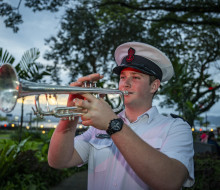
Taupō trumpeter in demand in brand new career with Royal New Zealand Navy Band
26 August 2025
Unfortunately you are viewing this website on an outdated browser which does not support the necessary features for us to provide an adequate experience. Please switch to a modern browser such as latest version of Google Chrome, Mozilla Firefox, Apple Safari or Microsoft Edge.
Ngā mihi nui
It's Samoa Language Week - Vaiaso o le Gagana Samoa. Read what being Samoan means to some of our personnel.
Petty Officer Steward Marieta Makasini says she is proud of how far she has come and how long she has served in the Royal New Zealand Navy.
“I joined the Navy in 2006. My goal was to become a police officer until I met the Navy recruiting person in the same building I worked. The recruiter was really friendly and their uniform inspired me and that made me want to join the Navy.
“Today I’m the Petty Officer for the trainees doing Basic Branch Training. That’s their trade training after finishing their basic training. They’ve been in the Navy for four months now. I look after them and I manage their daily routines.
“I was born on Safotu, Savaii, Samoa, growing up in Falealupo Savaii and New Lynn in New Zealand. I live in Belmont, Auckland.
“I moved from Samoa when I was 15 years old, which meant trying to fit into a different life style. Joining the Navy was a big commitment.
“What makes me proud of my language and culture is the loyalty, honesty, compassion, love, contribution and respect we share with others. These values, and pride of service, are what I bring to my work. I’m still loving it today.
“Being able to speak Samoan fluently is a blessing. By speaking and understanding Samoan language, individuals can access our cultural heritage, gaining insight into their ancestors’ way of life. This helps maintain a strong connection to one’s roots, ensuring that our traditions and values are passed down and celebrated.
“There is also my malu, a female traditional tattoo that is from the upper thigh to the lower knee. To me it is a representation of our ancestors and everything they represent. It’s very special to our Samoan culture because it’s such a sacred cultural treasure.
“My husband has deeply influenced who I am today. He is the reason I can post to ships and be away for a long time while he’s staying home with our children. It’s meant I’ve been able to do many deployments, including Hawai’i, Singapore, Tonga, sub-Antarctic islands, Kermadec Islands and humanitarian support during Cyclone Gabrielle last year. I’m proud of being a young mum with children and still serving at sea.
“For the future, I would love to see more Pasifika in the New Zealand Defence Force in higher ranks. And having a Pacific Island chaplain would be good for our people as someone to talk to for help if needed."
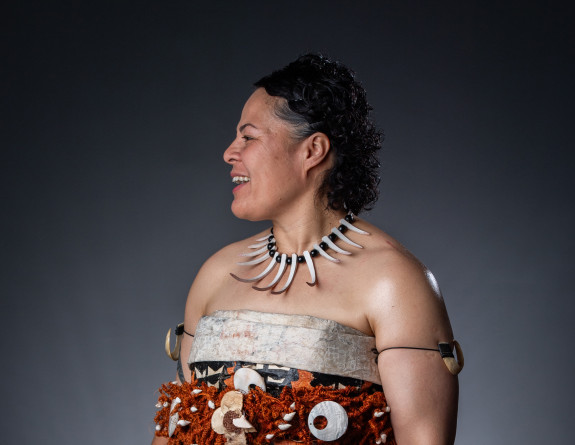
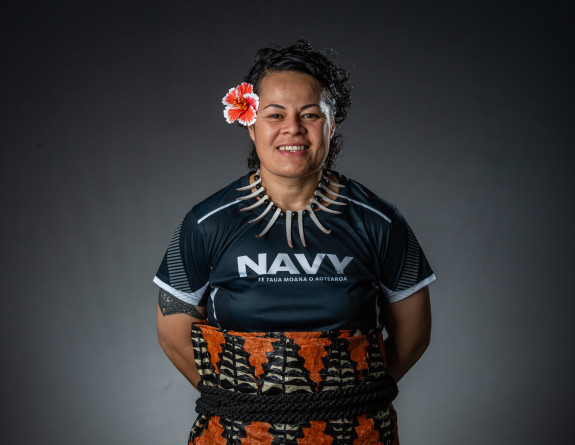
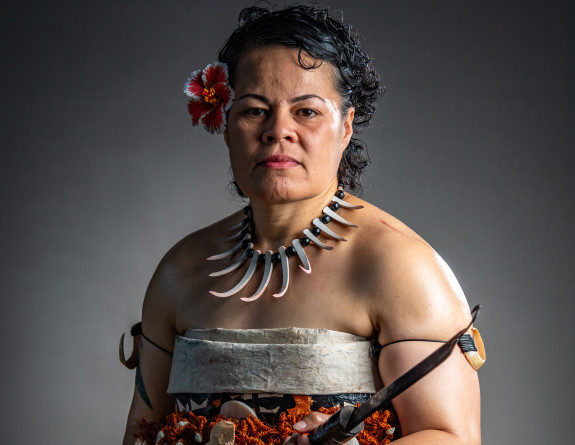
Private Kristin Sutherland says she feels proud to wear the uniform, not just for herself but for her family back home in Samoa.
“I wanted a fit and challenging lifestyle. I also felt like the NZ Army was the perfect choice for me because I don’t like the ocean so Navy was off the cards! I grew up in West Auckland, where I live now, and we had recruiters come to my high school when I was 14 and they sold me the Army dream.
“I’m a caterer, which means every day can change depending on what shift you’re on. If I’m on earlies or bakery shift I come in at 0530 to cook breakfast and lunch, or all the sweets and the breads and desserts. Bakery shift is my favourite. Late shift means starting at 1030 and cooking dinner, finishing around 1930. We also work weekends.
“I identify as Afakasi, but for those who don’t know that meaning I tell them I am Samoan / Maltese. My skin colour is white and I have red hair and freckles but I was raised with a lot of learning about my Samoan culture. I have always felt more of a belonging with my Polynesian friends and family.
“Our people are brave, courageous, have the best sense of humour, good hearts, the best cooks and eaters, fearless, strong and misunderstood!
“What makes me proud of my language and culture is that no matter where we are, we always somehow come together and know we don’t walk through this world alone. There aren’t many Samoans in the NZDF but for some reason when we come across one another you click with that person straight away, like there’s a natural sense of belonging among each other.
“My family don’t come from much but wearing this uniform make me feel like I’m doing something right. Like even though I make mistakes I will always know where I come from and what my background is and I’m grateful that I get to represent that through my service.
“I’m one of very few Samoan caterers in the NZ Army and I’ve had the pleasure of being in charge of a lot of Pasifika-themed functions. I’ve cooked “island food” for our island community, for the chiefs of small Pasifika militaries, for Polynesian Group afternoon teas and for Samoan Language Week.
“My parents and my son have been the biggest influence on who I am today. My parents have always been hard workers to provide what’s best for us kids and got through so many hardships. Also having my son three years ago made me build more confidence in myself as a woman. He has made me feel brave and give me a drive to provide him with the best life any mother can give. He also helped me find myself. I don’t even remember who I was before I had him.
“To me, preserving the language means passing on things we have learnt to our children and their children, including reading to them and writing stories for them.
“Everything happens for a reason. I don’t think the younger me could have imagined this would be my journey but I’m glad it didn’t go any other way.”
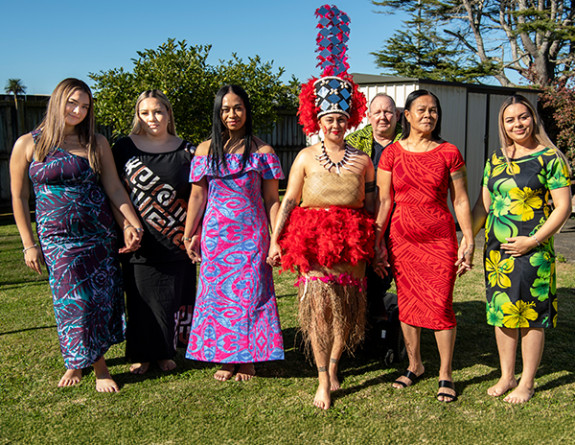
Sergeant Kirrin Borgman says we are all one big Defence Force ‘aiga (family), ready to support each other.
“I joined the Royal New Zealand Air Force (RNZAF) on the 1999 recruit course because my Mum thought it would be a good idea!
“Today I work at Personnel Archives and Medals (PAM) processing Long Service Awards (LSA) for current serving RNZAF personnel. We have so many amazing people, who have given so many years to the RNZAF so it is rewarding and humbling to be able to be a part of the process to recognise their service.
“I grew up in Titahi Bay, Porirua, with most of my extended family nearby. We moved to the Bay of Plenty, then to the Kapiti Coast, where I live now.
“I am half Samoan, half Scottish. I had a bit of an identity crisis when I was a teenager. I wasn’t really Samoan and I wasn’t really Scottish and not really feeling like a New Zealander either, I think.
“I played the bagpipes and was involved in Pipe Bands and Scottish events from a young age so I felt more comfortable with that side.
“In 2018 I joined a Waka Ama club in Singapore (where my husband was on an accompanied posting) and found that connection to my Samoan side.
“I remember being in a va’a (outrigger canoe) in Samoa when I was a kid and I felt like I was back where I was meant to be. I soon learned how to paddle a single person va’a and brought my own when my Grandmother, Momotu, passed away in 2020. I named it “Feso’otaiga o Motu”, which translates to “Connector of Islands”. So now my va’a connects me to Singapore, New Zealand, Samoa, my Grandmother and daughter Arya Momotu. So many islands and people and so much meaning!
“Now, I’ve accepted that I’m both cultures and that I don’t have to know everything about either culture to keep those cultures present in my life. It’s about the little things, a prayer said here, a special type of food there or even jewelry.
“I would describe my people as those who love me and those who I love back. Plus all of those who are related to me by blood or marriage, or circumstance, even if I’ve never met them!
“What makes me proud to be Samoan is seeing how my family can come together to support each other in good times and in bad. And watching my daughter learn Samoan at school. I’m so happy that she has that opportunity.
“I think being from a Samoan background I naturally foster that “family” aspect in the workplace. It made me a little bit shy initially as I tended to step back and not want to show others what I’m capable of. My view is that the Defence Force is all one big NZDF Aiga, and that we should be here to support one another."
Bombardier Nikolao Ioane says service to his family is important and serving in the New Zealand Defence Force gives him that sense of service towards his people.
“At high school I was part of my school services academy, which is a military-based programme. It gave me my first insight of what army life could be like. I enjoyed being in the team environment, and the physical aspect and challenges that came with it. The programme inspired me to join the army and want to serve my country. I joined the New Zealand Army in March 2014.
“Today I am a gunner in the Royal Regiment of New Zealand Artillery. I am a second in command on a gun detachment and one of seven people in my section.
“My role in the field is to ensure the correct ammunition is being prepared and loaded into a gun before firing. It is important that all ammunition e.g. high explosive, illumination and smoke rounds are correct and prepared in a timely manner to ensure that we can provide effective support for our friendly forces.
“I was born in Samoa. My family moved to Auckland in the late 1990s. It is my family that has influenced who I am today. My family inspire me to want to learn how to be a better person and to be a good example for them.
“Our cultural values include respect, humility and pride and that influences how I serve in so many ways. I transfer that pride into my work, and I show respect to hierarchy as we too can relate through our own matai systems.
“I am proud that the Samoan language is the third most spoken language here in NZ. Preserving my language is about making time and having the courage to want to develop and learn more about my language and culture and being able to share my knowledge with everyone.
“I am proud to know that there are many other Samoans out there who are on their own language journey. I am proud of Samoa’s history and how far they’ve come in today’s society.
“A moment in my career that I am proud of was representing the NZDF at the rugby league world cup in 2017. It was an emotional and unforgettable experience. I was not only able to represent my country but also my family and my people.
“I would like to be involved in making sure that our Pasifika community are aware of the resources available to them so that we can be an active community all year round. I would love to see a recruiting expo is schools with high Pasifika numbers, and have an annual cultural day where each culture can showcase their talents through entertainment and cultural foods."
Corporal Afoa says no matter where he is, he’s always ready to represent Samoa.
“I joined the New Zealand Army in 2014. I liked the physical and travelling aspects of the job. Certainly the physical side applies to my trade and unit, but there’s also plenty of physical training and lots of sports.
“I’m a movement operator, which involves Amphibious Operations such as Land-Sea or Sea/Land Operations, where we moving freight or vehicles between beach and a ship. We do aerial delivery where we build and rig loads to chuck out the back of planes. We move people and freight from A to B, in New Zealand or overseas.
“You travel a lot in this role. Last year alone I travelled to Australia, Tonga, England and Hawaii. I’ve also been to Antarctica, Fiji, New Caledonia and Dubai.
“I consider Porirua home. My grandparents moved here from Samoa and my parents are New Zealand-born Samoan. We’re a proud, hard-working, loving and charismatic people. I’m proud of importance of close community and family ties around Samoan culture.
“Whether at home, church, the rugby field or at work, I always witnessed my family or people working hard. I believe growing up in a Samoan environment, culture and family, it’s influenced what I believe is a hard work ethic, which I bring to my work in the Defence Force.
“In particular the values and ethics my Mum has taught me has definitely molded me into who I am today. I bet a lot of Pacific Island men would feel the same.
“To me, preserving the language is making an effort to either retain or learn your language so you can pass it on to the next generation being your family, colleagues or friends. It’s definitely harder than it sounds!
“I would tell people to never be ashamed of your identity in any way. I’m not best when it comes to Gagana Samoa, and I’ve taken steps to re-learn and gain confidence to speak but either way I’ll always be confident and proud of my identity, my family and my culture. No matter where I travel to, no matter what I’m doing or who I’m around, I’ll always represent.
“I’d like to see more of our people into the recruiting side of the job. Pasifika people in uniform need to move into these roles so our younger generation can see we do have a presence within the Defence Force and there are opportunities here.”